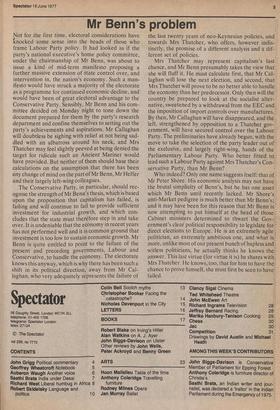Mr Benn's problem
Not for the first time, electoral considerations have knocked some sense into the heads of those who frame Labour Party policy. It had looked as if the party's national executive's home policy committee, under the chairmanship of Mr Benn, was about to issue a kind of mid-term manifesto proposing a further massive extension of state control over, and intervention in, the nation's economy. Such a manifesto would have struck a majority of the electorate as a programme for continued economic decline, and would have been of great electoral advantage to the Conservative Party. Sensibly, Mr Benn and his committee decided on Monday night to tone down the document prepared for them by the party's research department and confine themselves to setting out the party's achievements and aspirations. Mr Callaghan will doubtless be sighing with relief at not being saddled with an albatross around his neck, and Mrs Thatcher may feel slightly peeved at being denied the target for ridicule such an Ancient Mariner would have provided. But neither of them should base their calculations on the assumption that there has been any change of mind on the part of Mr Benn, Mr Heffer and their largely left-wing colleagues. The Conservative Party, in particular, should recognise the strength of Mr Benn's thesis, which is based upon the proposition that capitalism has failed, is failing and will continue to fail to provide sufficient investment for industrial growth, and which concludes that the state must therefore step in and take over. It is undeniable that the economy in recent years has not performed well and it is common ground that investment is too low to sustain economic growth. Mr Benn is quite entitled to point to the failure of the present and preceding governments, Labour and Conservative, to handle the economy. The electorate knows this anyway, which is why there has been such a shift in its political direction, away from Mr Callaghan, who very adequately represents the failure of the last twenty years of neo-Keynesian policies, and towards Mrs Thatcher, who offers, however indistinctly, the promise of a different analysis and a different set of policies.
Mrs Thatcher may represent capitalism's last chance, and Mr Benn presumably takes the view that she will fluff it. He must calculate first, that Mr Callaghan will lose the next election, and second, that Mrs Thatcher will prove to be no better able to handle the economy than her predecessor. Only then will the country be prepared to look at the socialist alternative, sweetened by a withdrawal from the EEC and the imposition of import controls over manufactures. By then, Mr Callaghan will have disappeared, and the , left, strengthened by opposition to a Thatcher government, will have secured control over the Labour_ Party. The preliminaries have already begun, with the move to take the selection of the party leader out of. the exclusive, and largely right-wing, hands of the Parliamentary Labour Party. Who better fitted to lead such a Labour Party against Mrs Thatcher's Conservative Party, than Mr Benn?
Who indeed? Only one name suggests itself: that of Mr Peter Shore. His economic analysis may not have the brutal simplicity of Benn's, but he has one asset which Mr Benn until recently lacked. Mr Shore's anti-Market pedigree is much better than Mr Benn's; and it may have been for this reason that Mr Benn is now attempting to put himself at the head of those: Cabinet ministers determined to thwart the Government's clear political responsibility to legislate for direct elections to Europe. He is an extremely agile politician, an extremely ambitious one, and what is more, unlike most of our present bunch of hapless and witless politicians, he actually thinks he knows the answer. This last virtue (for virtue it is) he shares with Mrs Thatcher. He knows, too, that for him to have the chance to prove himself, she must first be seen to have failed.


































 Previous page
Previous page